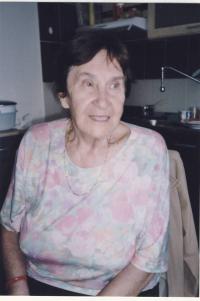We were together, united by our misfortune

Download image
Mrs. Blanka Včeláková was born on 22 June, 1926, in Jablonec nad Nisou. Since her childhood, she was a member of the Scout. In 1938, after the annexation of the Sudetenland, the family moved to Hradec Králové. After finishing secondary school and a vocational school for female professions in 1943, she worked in the office at the railway station in Hradec Králové. In May 1945, she returned to Jablonec nad Nisou together with her father and sister. Until the banning of the Scout in 1948, she was an active girl scout. In the fall of 1949, she randomly met a tram driver who was engaged in a resistance group which she wanted to join. However, the group was revealed even before any rebellious actions materialized. In December 1949, Blanka was arrested. A court in Liberec sentenced her to sixteen years in prison in a group process that took place in June 1950. She served her term in prisons in Česká Lípa, Pankrác, Kladno, Molitorov, Pardubice, a military hospital in Pankrác and a prison in the Slovak town of Zeliezovce. She was paroled in the summer of 1957 and after returning to Jablonec nad Nisou, she worked in the glass-cutting and laundry industries. Mrs. Blanka Včeláková, one of the founding members of the local branch of the Confederation of Political Prisoners, currently lives in Jablonec nad Nisou.
